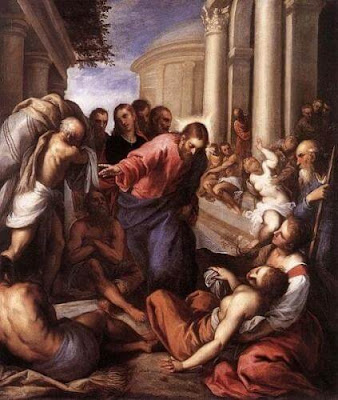“The Lord your God will raise up for you a Prophet like me from your midst, from your brethren. Him you shall hear, according to all you desired of the Lord your God in Horeb in the day of the assembly, saying, ‘Let me not hear again the voice of the Lord my God, nor let me see this great fire anymore, lest I die.’ “And the Lord said to me: ‘What they have spoken is good. I will raise up for them a Prophet like you from among their brethren and will put My words in His mouth, and He shall speak to them all that I command Him.’” (Deut 18:15–18)
Then they went into Capernaum, and immediately on the Sabbath He entered the synagogue and taught. And they were astonished at His teaching, for He taught them as one having authority, and not as the scribes. … Then they were all amazed, so that they questioned among themselves, saying, “What is this? What new doctrine is this? For with authority He commands even the unclean spirits, and they obey Him.” And immediately His fame spread throughout all the region around Galilee. (Mark 1:21–22; 27–28)
It is written in Deuteronomy, “The Lord your God will raise up a prophet like me for you from your brothers. You shall hear Him; and it shall be that every soul which will not hear that prophet shall be destroyed from his people.” Therefore some prophet was specially expected who would be similar to Moses in some respect, to mediate between God and humanity, and who would receive the covenant from God and give the new covenant to those who became disciples. And the people of Israel knew so far as each of the prophets was concerned that no one of them was the One announced by Moses.
Origen: Commentary on the Gospel of John 6.90
Even the demons cried out, on beholding the Son: “I know who you are, the Holy One of God.” Later the devil looking at Him and tempting Him would say: “If you are the Son of God.” All of these thus recognized the Son and the Father, yet without believing. So it was fitting that the truth should receive testimony from all, and should become a means of judgment for the salvation not only of those who believe but also for the condemnation of those who do not believe. The result is that all should be fairly judged and that the faith in the Father and Son should be a matter of decision for all, so that one means of salvation should be established for all, receiving testimony from all, both from those belonging to it who were its friends and by those having no connection with it who were its enemies. For that evidence is most trustworthy and true which elicits even from its adversaries striking testimonies on its behalf.
Irenaeus, Against Heresies 4.6.6–7





